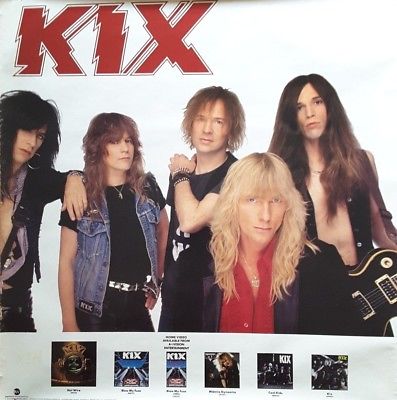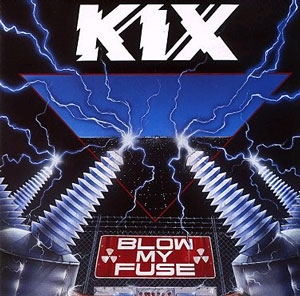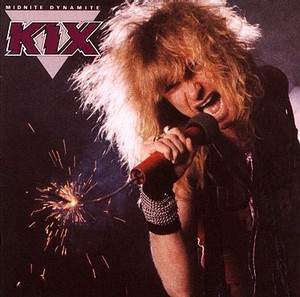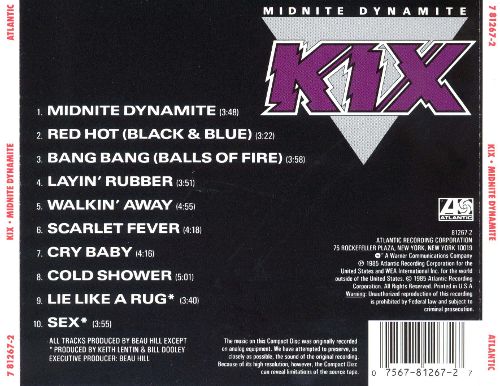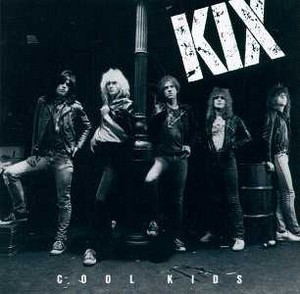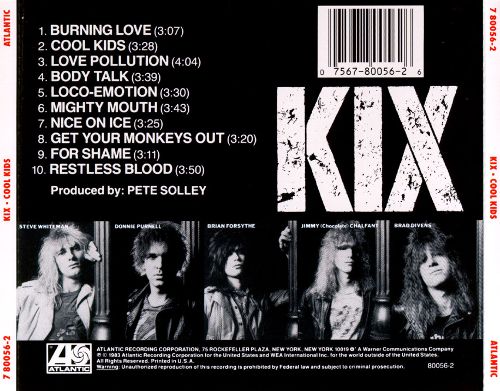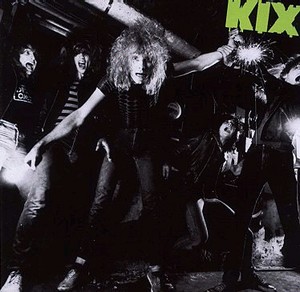Guest review by Holen MaGroin – part 5 in his KIX series
 KIX – Hot Wire (1991 Atlantic)
KIX – Hot Wire (1991 Atlantic)
It took the almighty Kix three years to follow up their commercial breakthrough Blow My Fuse. When they did, they had a new record contract, and an assload of debt from their first three albums. Being that this was 1991, the clock was ticking before that putz from Seattle would change the face of rock music forever by replacing talented musicianship and fun with glorified punk songs about deodorant. The resulting album Hot Wire was the band’s heaviest album to date, with their hard rock influences taking over their sound completely. While Hot Wire is still an entertaining listen, it’s not as consistent as the albums that preceded it, and is a little derivative at times.
Hot Wire is jumpstarted by the title track, which starts off with a riff that sounds like Ted Nugent’s “Just What the Doctor Ordered”, and ends with a loving homage to “Have a Drink on Me”. The sonic annihilation in between is a whole hell of a lot of fun, and has Kix playing some of the most aggressive music of their career. Steve Whiteman in particular is taking no prisoners with an absolutely electrifying vocal performance that commands attention and respect. The song juggles the head banging verses with a trademark melodic Kix chorus that will blow your mind. Maybe Kurt Cobain was listening to this when his Kurt Cobrains hit the floor in April of 1994. It’s a great choice to open the album with, as it dispels any notion that Kix has become less hungry as a result of their platinum success.
Kix follows it up with what could only be described as a tribute to AC/DC’s “Big Balls”, complete with a Bon Scott impression. In lead single “Girl Money”, Whiteman channels Scott while talking about a woman of low moral fibre across the bar. The chorus is an absolute explosion of melody, literally. If you listen carefully, you can hear cannons going from the left to the right speaker after the lyrics “bang boom party”. The attention to detail is not only amusing, but it reflects the sonic identity of the record. The production on this album serves to polish the rough edges while retaining all the sonic power that Kix have to offer. It sounds good, but there are no frills to be found. This is a rock and roll record, and the band is going to treat it as such. No more Cool Kids new wave pandering, the group is out to rock your world.
The fourth slot on the album is left to “Tear Down the Walls”, a weak ballad that was probably recorded to capitalize on the success of “Don’t Close Your Eyes”. It’s pleasant enough, but one can’t help but compare it to superior ballads on past Kix records. While it’s not nearly as iconic or enjoyable as “For Shame”, “Walkin’ Away”, or “Don’t Close Your Eyes”, it’s still a much better decision to listen to it than to marry Courtney Love, in my opinion only of course.
Kix only has one ballad again, and gets away with it by preceding it with the hook laden “Luv-A-Holic”, which has a similar structure to “Get It While It’s Hot” from the previous record, done in a heavier style that is more representative of the Hot Wire sound. It’s one of the best songs on the album, and the deal only gets sweeter when “Rock & Roll Overdose”, (a song title I believe Kurt took too literally) greets the listener after the lacklustre ballad. One of the heaviest tunes Kix have ever done, it’s a nice ode to rock and roll itself with Whiteman bringing back his powerful raspy vocals from the title track. Guitarists Ronnie “10/10” Younkins and Brian Forsythe really get to shine on this track with each getting a chance to show off their solo chops. It’s much more enjoyable than listening to nursery rhyme melodies over three chord punk songs and pretending like you hate any band that has reached any kind of success, including your contemporaries that praise you.
What sinks the album is a sense of monotony. Some of the lesser tunes begin to sound the same, and some of them are lyrically lacking. “Hee Bee Jee Bee Crush”, “Bump the La La”, and “Same Jane” were in desperate need of penmanship reform. There’s also not as much variety as you would normally expect from a Kix album, as they seem to be firmly rooted in a hard rock sound. Choruses lack some of the staying power that they had on earlier albums, and the songs begin to run together.
While by no means a bad album, Hot Wire comes as a bit of a disappointment after the quality of the two previous outings. Unfortunately, due to shifting (shitty) tastes, Kix would only release one more album on their major label (1993’s appropriately titled Contractual Obligation Live!) before being pushed to the indie world. The mighty titans would regroup for one more studio album with the original lineup. They disappeared for the better part of twenty years before reemerging with a new bassist as strong as ever. As for Hot Wire…
3.5/5 stars
Authors note: I don’t really hate Nirvana, but they’re just so easy to poke fun at. I would take Badmotorfinger, Ten, & Ritual de lo Habitual over Nevermind any day of the week though.
